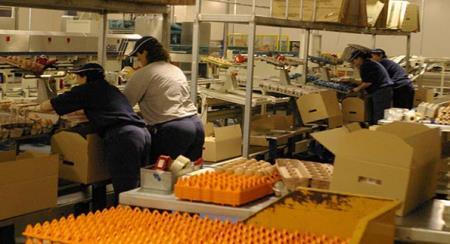 COVID-19 is now extending from urban areas to rural counties where intensive livestock operations including egg-production complexes are located. One large enterprise in Michigan has reported a diagnosis in a member of a work crew and it is inevitable that infection will impact egg producers. It is hoped that the incidence rate in egg packing and breaking facilities will be less than in red meat and chicken plants, some of which have been closed temporarily due to severe absenteeism and to carry out reconfiguration and decontamination.
COVID-19 is now extending from urban areas to rural counties where intensive livestock operations including egg-production complexes are located. One large enterprise in Michigan has reported a diagnosis in a member of a work crew and it is inevitable that infection will impact egg producers. It is hoped that the incidence rate in egg packing and breaking facilities will be less than in red meat and chicken plants, some of which have been closed temporarily due to severe absenteeism and to carry out reconfiguration and decontamination.
Based on experience to date, it would appear that personnel in egg packing plants would be at greater risk than then their colleagues in barns where there is greater opportunity for social distancing.
Protection of the workforce on a complex can be accomplished with the following measures:-
- Workers should be screened each day and questioned as to their health and body temperature should be measured.
- Effective masks must be made available and their use enforced
- Frequent hand-washing with soap should be encouraged. In many plants, hand-washing facilities are limited to an area near the entrance in accordance with AMS requirements so additional stations are required.
- A program of daily decontamination of both work areas and break rooms should be introduced concurrent with the third-shift cleaning.
- To reduce the number of employees in break-rooms, during breakfast and lunch, schedules should be staggered as far as possible with workers encouraged to maintain social distancing
- It is considered essential to maintain straightforward and honest communication with workers regarding the health status of the community and personnel in the company
- Special attention should be directed to drivers of feed trucks and personnel involved in delivery of product to DCs and stores. Close contact with receiving workers at these destinations should be avoided. Drivers should not have direct contact with production and packing personnel.
- Workers should be encouraged to maintain social distancing and to avoid gatherings outside of their work even if lockdown is not implemented in the county or state of operation.
- All employees should be encouraged to seek medical treatment early if any symptoms of COVID-19 are experienced. Companies should provide sick benefits to discourage reporting to work while affected.
- Experience in Quebec demonstrated that workers at a hog plant were actually infected with COVID-19 virus during commuting. Employees should be cautioned to as far as possible maintain social distancing if sharing vehicles and wear masks and gloves. Company shuttle buses should not be used to transport employees.
- Producers should encourage workers to adopt healthy lifestyles including cessation of smoking, moderation in alcohol intake and to initiate weight reduction and exercise programs.
- Installation of UV modules to generate and dispese vaporised hydrogen peroxide serving to destroy viruses and bacteria suspended in the air of offices, changing-areas and break rooms.
 It is obvious that effective control of COVID-19 will only be achieved with wide application of a safe and effective vaccine that may only be available in early 2021.
It is obvious that effective control of COVID-19 will only be achieved with wide application of a safe and effective vaccine that may only be available in early 2021.
Measures enforced through March and April of 2020 have only "flattened the curve" to avoid overwhelming medical resources in the short term. Since a significant proportion of the rural population is completely susceptible to SARS-CoV-2 the virus responsible for COVID-19 as of April, an increase in the incidence rate should be expected following relaxation of current methods to suppress infection. Most epidemiologists and public health scientists predict the high possibility of an upsurge in cases during the fall and winter months. Accordingly, all employees should receive an influenza vaccine in September since co-infection will create additional complications for those exposed to the coronavirus.
Hopefully antigen and antibody testing will become more readily available to identify both asymptomatic and affected individuals and those with immunity in the workforce and the community. Identifying contacts of COVID-19 patients will be necessary resulting in quarantine and testing.
It is now evident that the world will have to live with COVID-19 or subsequent variations of SARS-COV-2 virus for the foreseeable future. Accordingly, mechanization should be considered to reduce dependency on manual labor. Robotic de-stackers for off-line plants, case packers and pallet stackers operate at the turn of a switch. With increasing labor rates and uncertainty as to availability of workers in some areas, the capital investment in robotics and mechanization will provide a higher return on investment then during pre-COVID operation
The indirect effect of COVID-19 on the market for shell eggs has impacted the industry with a disproportionate effect on the liquid and food service segments, creating financial pressure on both breakers and shell egg producers. The initial response and adaptation in the market will soon be followed by the reality that the disease will affect workers and reduce production rates in plants. Accordingly, managers should develop contingency plans and apply appropriate preventive measures.